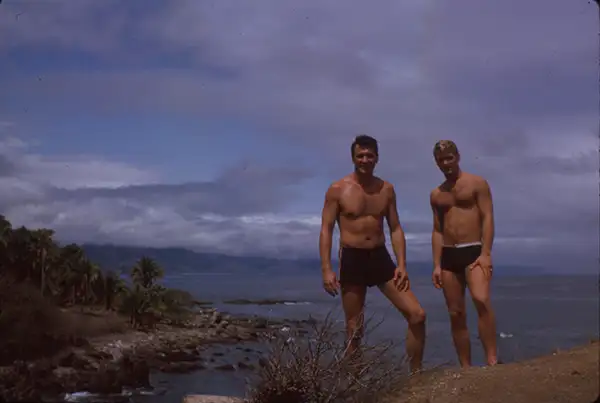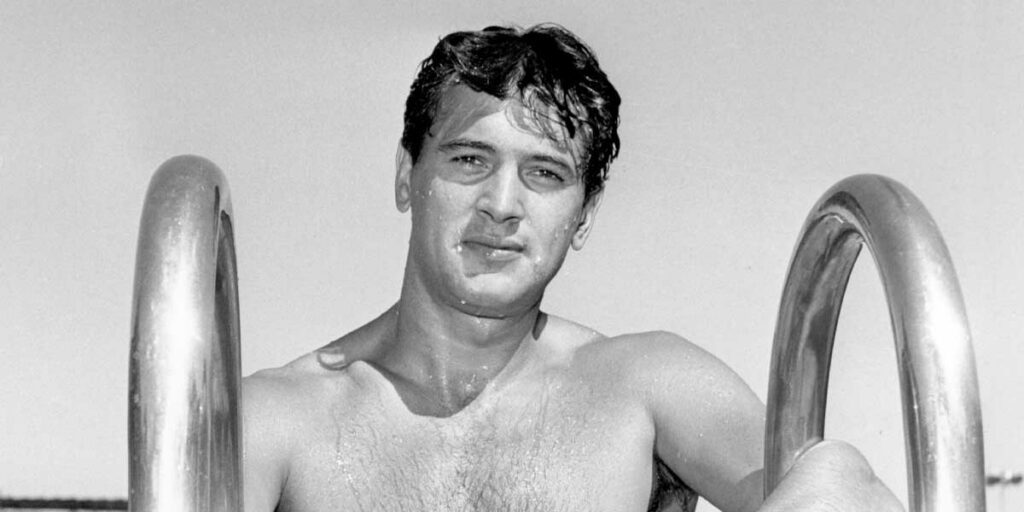Rock Hudson: All That Heaven Allowed is a delicate and intimate showcase of the life of Rock Hudson, one of Hollywood’s most distinguished actors of the 1950s and 60s.
Stephen Kijack’s Rock Hudson: All That Heaven Allowed is a striking love letter to both Rock Hudson and the later years of the golden age of Hollywood cinema. Stephen Kijak reclaims the story of Rock Hudson’s life and delicately tells his story through the eyes, and words, of his closest friends, lovers, and co-stars through a patchwork montage of archive footage, diary entries and anecdotes.
Roy Harold Fitzgerald, known more professionally as Rock Hudson, can be considered one of Hollywood’s finest jewels: a man that every woman wanted to be with, and every man aspired to be like. Stephen Kijak’s latest documentary, Rock Hudson: All That Heaven Allowed, opens with a stunning visual sequence of a diamond sphere that is compared to Rock, exhibiting some of his most notable performances as it spins.
Stephen Kijak’s documentary tells Rock’s story in a particular way, primarily through archive footage of Rock’s extensive film and TV career, voiceovers, and a few face-to-face interviews with people who were close to Rock, including Elizabeth Taylor and Armistead Maupin. This approach to documentary filmmaking was the perfect choice for a subject as fierce and multi-faceted as Rock Hudson, whose on-screen persona differed from his real life. It is clear from the very beginning that this film’s main purpose is to celebrate Rock’s life, one that may not have been lived entirely out loud, but one that was certainly lived well.
Through the documentary, we learn that Rock was born in Illinois in 1925, enlisted in the United States Navy in World War II, and once he packed up and moved to Los Angeles in the late 1940s, everything changed. Through voiceovers and photographs, we learn that once Rock met his friend, and alleged lover, Kenneth Hodge, he was introduced to the world of cinema and the many opportunities it had to offer. Kenneth went on to introduce Rock to his agent, Henry Wilson, which was when his career really started to kick off.

The film delves into the fast-evolving industry that was Hollywood of the 50s and 60s. It displays how the appetite for feminine, quirky-looking men of the French New Wave was swapped out for more masculine men after World War I and II. This was a category that Rock Hudson elegantly slotted himself into, with one of the most popular film genres during the height of Rock’s career being melodramatic romances. These films tended to centre around a stereotypical heterosexual male/female relationship, which were the type of films for which Rock found most of his fame.
Some of Rock’s most notable projects highlighted within the documentary are Pillow Talk, Lover Come Back, McMillan & Wife, and of course, Douglas Sirk’s All That Heaven Allowed, which is where the documentary draws its title from. Kijak points out that, in many of Rock’s roles, he unintentionally manifested and mirrored his own life experiences, in particular the role of Brad Allen opposite Dorris Day’s Jan Morrow in Pillow Talk, in which Rock, a closeted gay man, plays the role of a straight man posing as a gay man.
Whilst Kijak chooses to focus more on the highs of Rock’s career and the lovely memories told by those closest to him, the narrative does touch on some of the controversies and hardships in Rock’s life, starting with his marriage to Phyllis Gates, Henry Wilson’s assistant. Phyllis was in fact rumoured to be bisexual or a lesbian herself, so when the two married, people began to question the coincidence of it all, and how it appeared to have been planned/arranged in order to keep Rock’s career blazing. As the film reaches the second half of the narrative, Kijak touches upon Rock’s unexpected death in 1985, after a short battle with AIDS, for which he has become known as one of the very first celebrities to be diagnosed.
Rock’s death was shocking to the public not only because it was sudden, but also because it confirmed speculations that he was not heterosexual. Because of this, Rock was treated differently as he reached the end of his life, even by people he once considered friends. Most notably Nancy Reagan, once a close friend of Rcok’s, declined his plead for help whilst he was being treated at a Hospital in France mere days before his death.
In a bittersweet quote at the end of the film, we see a movie scene in which Rock’s character quotes “he died the death of a hero and deserves our tears”. This line can now be applied to Rock’s own death, and the significant impact he had, and still continues to have, on the open discussions surrounding AIDS.
One of the most beautiful quotes included in the film is from Rock’s close friend, and avid supporter of the LGBTQ+ community, Elizabeth Taylor. She expressed that she prayed Rock had not died in vain, but that she found solace in the fact that “art lives on forever”, which is a quote that perfectly summarises what this whole film is about. Rock Hudson will live on forever in the art of his work, and Stephen Kajik takes footage of his work, alongside the beautiful memories cherished by his loved ones, and combines it all into an intricate filmreel that can now be shared with, and enjoyed, by people all around the world, inviting everybody, no matter how wide a knowledge they have of Rock, to learn more and celebrate the kind and generous man that he was. Rock Hudson: All That Heaven Allowed is certainly a film that sticks with you for a long, long time after you watch it.
Rock Hudson: All That Heaven Allowed will be available to download and rent on digital platforms in the UK from 23 October, 2023. The film is now available to watch on Max in the US.

